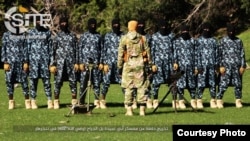The top U.S. military commander in the Middle East says Afghanistan has assured the United States that Islamic State-Khorasan fighters captured in the country's north "will be treated as war prisoners."
"They have been transported from Jowzjan province to government detention facilities, where they will be investigated and help to account for any war crimes they are found to have committed," U.S. Central Command's General Joseph Votel told Pentagon reporters Wednesday.
His statement echoed comments made Monday by Afghan Chief Executive Abdullah Abdullah, who said any "war criminals" would face justice.
About 250 IS-Khorasan fighters under the command of Mawlawi Habib Rahman surrendered last week following a monthlong campaign by Taliban forces to rid the province of the terror group.
The captured fighters were later handed over to the Afghan government. But reports that some of the IS-Khorasan fighters might be treated as "honored guests" sparked an outcry from residents.
Votel said such talk came "at a moment in time after the surrender when the Afghans were working through the details," adding that the process was "something that the Afghan government said they could have managed better."
He said some of the confusion might have come from the fact that many IS-Khorasan fighters are former Taliban members who switched allegiances for various reasons. Both the U.S. and Afghanistan have been pushing for reconciliation with the Taliban as they seek an end to years of fighting.
But Votel said there is no going back for any fighters who pledge allegiance to the Islamic State.
"We harbor no illusion with ISIS-K," he said, using an acronym for the group.
"[Those fighters] adopted the ideology, some of the techniques, the approaches, kind of what I would just call the mindless violence that has been associated with ISIS and are applying that in their campaign," Votel said. "That, we don't believe, is reconcilable."
US approach in Afghanistan
The Central Command commander also said no one should expect major changes to the U.S. strategy in Afghanistan.
"I think the strategy that we have in place is the right one," Votel said when asked what to expect when Army General Scott Miller takes over as commander of U.S. Forces-Afghanistan.
Still, he said, there are some areas "where we can tweak."
"We want to make sure we're taking actions to minimize vulnerabilities for the Afghan forces, so minimizing remote checkpoints and things like that are an important aspect of this," Votel said.
"It's also important that we look at some of the utilization of some of their high-end capabilities, Afghan special operations forces," he said. "We have to be mindful that they are not overused."
Ayaz Gul contributed to this report.





